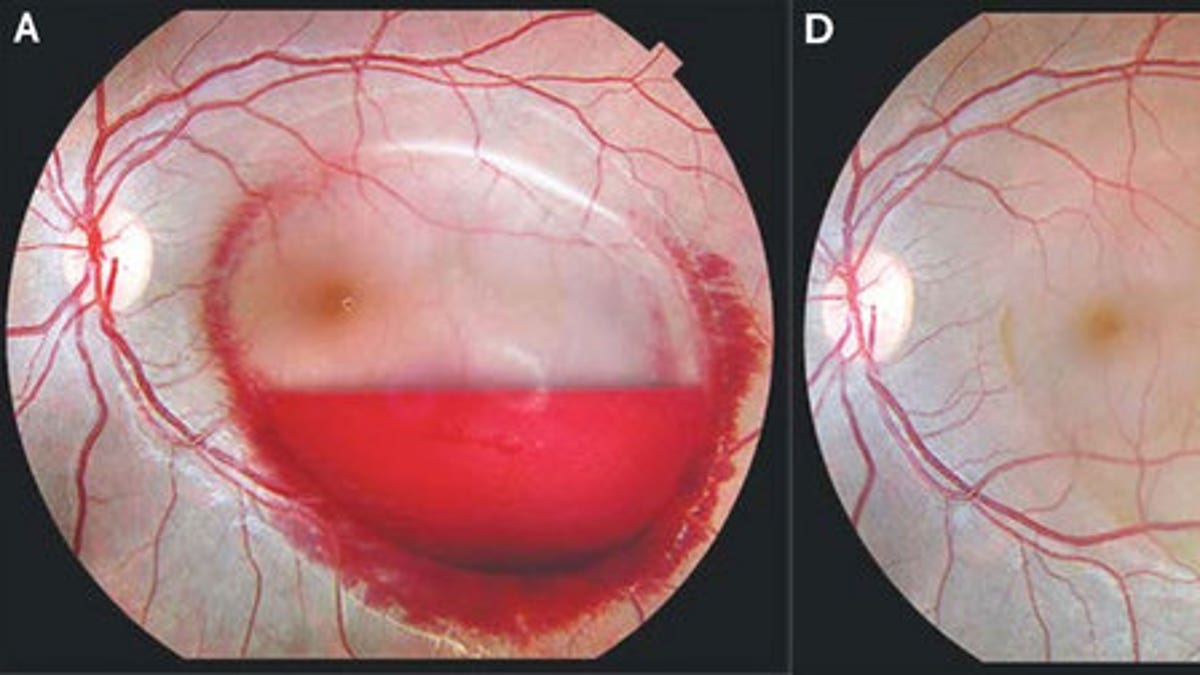
Forceful vomiting resulting from morning sickness caused a woman to burst a blood vessel in her left eye. Above, an image of the eye hemorrhage before and after it healed. (The New England Journal of Medicine ©2014)
Pregnancy can cause vision problems in sometimes unexpected ways, as two new medical reports show.
In one report, a 25-year-old first-time mother experienced blurred vision and flashes of light in both eyes when she was 36 weeks into her pregnancy.
An eye exam showed she had damage to the back of her eye, including swelling of the optic nerve. Another test showed the woman also had extremely high blood pressure, and a urine sample revealed she had abnormally high levels of protein in her urine.
Doctors determined that her eye problems were caused by severe preeclampsia, a complication of pregnancy involving high blood pressure and high levels of protein in the urine, according to the case reported by the researchers, from Mohammed V University in Morocco. [9 Uncommon Conditions That Pregnancy May Bring]
The only cure for preeclampsia is to deliver the baby, and the woman underwent a prompt Caesarean section. She had a baby boy, who, despite his low birth weight, appeared to be healthy. Three months later, the woman's vision was back to normal, the researchers said.
Dr. Jill Rabin, chief of ambulatory care, obstetrics and gynecology at Long Island Jewish Medical Center in New Hyde Park, N.Y., who was not involved in the woman's case, said a change in vision can be one symptom of preeclampsia. (Others symptoms include severe headaches, upper abdominal pain and sudden weight gain.) Symptoms of preeclampsia can sometimes be subtle, or very obvious, Rabin said. If pregnant women have any changes in vision, especially during the third trimester of pregnancy, they should see their obstetrician/gynaecologist right away, Rabin said.
In the second report, a 25-year-old pregnant woman from Canada noticed a dark spot in her vision after an episode of morning sickness during the 11th week of her pregnancy.
An exam showed that a blood vessel in her left eye had burst during her forceful vomiting, which caused bleeding in the eye.
Episodes of violent vomiting can increase pregnant women's blood pressure, including an increase in pressure in the vessels inside the eye, said Dr. Netan Choudhry, director of vitreoretinal surgery at the Herzig Eye Institute in Toronto, who treated the woman. This increase can cause blood vessels in the eye to rupture, and then blood can become trapped in the eye, Choudhry said.
Violent coughing, sneezing or straining during bowel movements can also cause blood vessels to rupture, Choudhry said.
But the body can often heal this injury on its own, just as it would with a bruise, Choudhry said. In the woman's case, her injury was monitored but did not need treatment, and it healed after about five months. In some cases, surgery is needed to release the blood in the eye, Choudhry said.
Both reports are published in the Feb. 20 issue of the New England Journal of Medicine.
Copyright 2014 LiveScience, a TechMediaNetwork company. All rights reserved. This material may not be published, broadcast, rewritten or redistributed.
